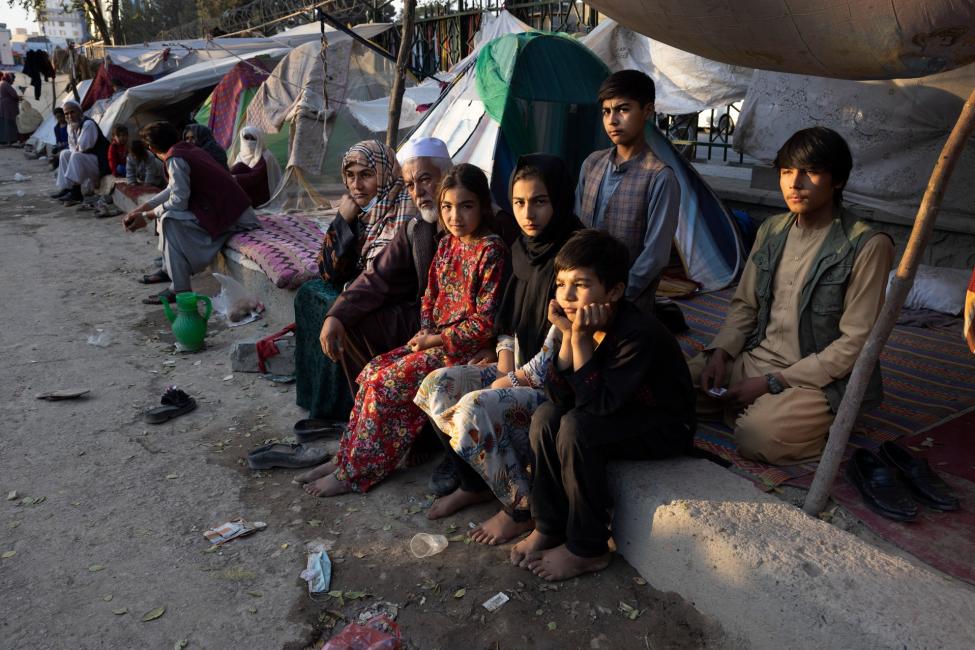-
Who we are
WHO WE AREThe International Organization for Migration (IOM) is part of the United Nations System as the leading inter-governmental organization promoting since 1951 humane and orderly migration for the benefit of all, with 175 member states and a presence in 171 countries.
-
Our Work
Our WorkAs the leading inter-governmental organization promoting since 1951 humane and orderly migration, IOM plays a key role to support the achievement of the 2030 Agenda through different areas of intervention that connect both humanitarian assistance and sustainable development.
What We Do
What We Do
Partnerships
Partnerships
- Where we work
-
Take Action
Take Action
Work with us
Work with us
Get involved
Get involved
- Data and Research
- 2030 Agenda
The Race Against Time to Prevent a Humanitarian Disaster in Afghanistan
Statement by António Vitorino, Director General, International Organization for Migration
Kabul – Conflict and insecurity, grinding poverty exacerbated by an economy in freefall, severe drought and the COVID-19 pandemic have pushed Afghanistan to the brink of collapse.
I leave the country after a two-day visit deeply impressed by the work being done by humanitarian actors and the resilience of the Afghan people in the face of immense challenges.
I am, however, profoundly concerned for the future: as the bitter winter approaches, there is a real risk that the deteriorating humanitarian situation will result in increased displacement, vulnerability and suffering, and that the modest social and development gains of the past two decades will be lost.
Five and a half million people are internally displaced – roughly the population of Finland – including more than 670,000 forced to leave their homes so far this year, 60 per cent of whom are children. Aid and support is needed for mobile populations, including internally displaced people, returnees and under-served host communities.
We are indeed in a race against time, as emphasized by the UN Secretary-General António Guterres, to help these people prepare for winter. We are going “door to door” to see what is needed and are providing shelter, blankets, warm clothing, and cash for fuel and heating. We are planning to expand winterization assistance to every province in the country to reach 200,000 people in need.
More than half the population is struggling to eat, malnutrition is reaching dramatic levels, especially for many children, and over 80 per cent of the people we have surveyed say they have lost their jobs and livelihoods. Millions are living in inadequate shelters with limited access to basic services, including sanitation and health care.
Increasing returns to the country have compounded the challenges. More than 1 million Afghans have returned from Iran and Pakistan this year, while others are trying to leave the country. The majority were deported, returning to Afghanistan often broke and broken, in need of health support, food and rest. The task of reuniting with family and reintegrating into communities – especially for those who have been in Iran or Pakistan for years – is tremendously difficult considering the high levels of unemployment and food insecurity.
Climate change has also hit Afghanistan hard and contributed largely to internal displacement. We estimate that around 70 per cent of the population has been impacted by drought and flooding. Crop failures are a reality, and an economic collapse would be devastating.
I am convinced that inclusive, comprehensive measures are the best way to protect and promote livelihoods – especially those of Afghan women – and to ensure access to essential services for conflict-affected communities across the country.
While international action intensifies to meet urgent humanitarian needs, I believe it is also critical to support sustainable livelihoods, and work with the Afghan people to reduce their risk and vulnerability to climate change, conflict and further disasters as we have been doing for decades. This can be done through targeted initiatives to promote resilience and adaptability. IOM is already implementing risk reduction, transition and early recovery programmes across Afghanistan, including critical infrastructure works to protect communities from floods, and to bolster the productivity of farmlands.
Most importantly, all interventions, aid and support must embrace and empower the women and girls who are indispensable to the future of Afghanistan. The country will struggle to attain peace, stability and development without their active inclusion and contributions. The entire Afghan population, including women, men, boys and girls across all ethnic groups, must remain fully represented and able to participate meaningfully in the daily life of their communities and country.
IOM is committed to staying and delivering in full solidarity with the Afghan people. More can and must be done, but it will take the sustained attention and generosity of the global community to harness the strength of the people and avoid a humanitarian catastrophe the fallout from which could reverberate across regions and generations.
***
As published on Euronews
For more information, please contact:
Safa Msehli, email: smsehli@iom.int, Tel: +41974035526
Ryan Schroeder, email: rschroeder@iom.int, Tel: + 32 492 25 02 34
